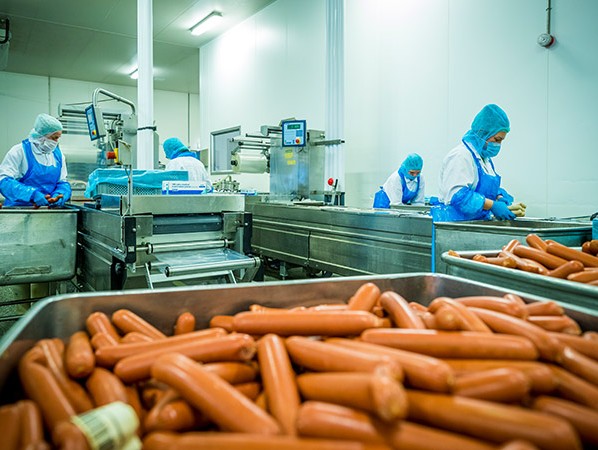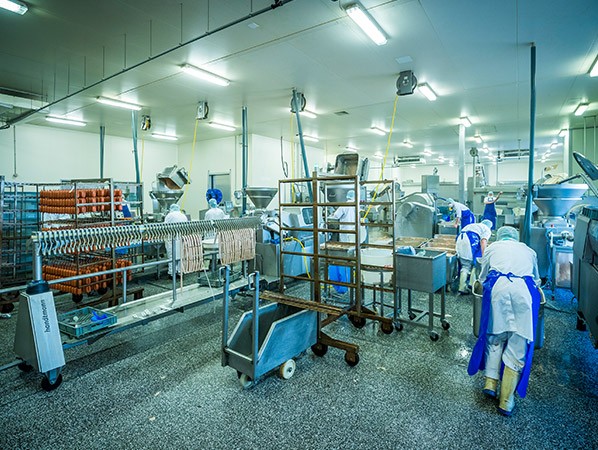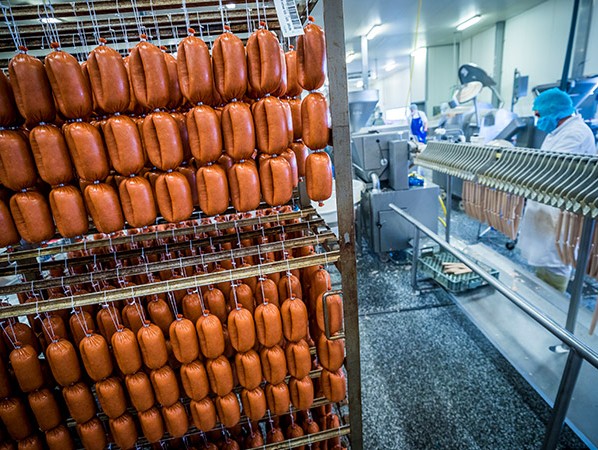
In 1991, Simons started producing halal meat products on a small scale. In 2019, the company is operating globally on a large scale. What happened between then and now?
Simons Halal Food is the largest supplier of private label halal meat products in Europe. This is of course due to the entrepreneurial spirit that characterises the company and greatly appeals to its customers. “We are doers with a plan, and we have a clear vision and strategy”, John Seegers, director and owner of Simons Halal Food, says to summarise the mentality. “Most leads are generated based on our excellent reputation, not our relentless search for great partners. Our antenna for opportunities can be considered exceptional. When you see an opportunity, you shouldn’t start over-analysing things, because then you risk being too late. At the same time, you do need to be careful so that you can meet the customer’s expectations.”
Simons is the meat product manufacturer that, in a distant past, found success with their Real Limburg bratwurst and the original curry sausage. The brand and its production have been taken over by Maasland, and those products are still available all over the country at snack bars and other out-of-home points of sale. That heritage is important to Simons. “That is our origin, and we are proud of that.”
The first impetus for the transformation of the business was in 1991, when Simons was supplying asylum seekers’ centres on a small scale via (then) Gastronoom (now Bidfood). “This was a not-in-my-backyard show for us, and we weren’t quite sure what we got ourselves into. We did know that pork is not allowed, so it had to be chicken, lamb or beef, but we had to learn about everything else.” A new policy measure became an obstacle, however. The central kitchens in the asylum seekers’ centres were closed, and personal budgets were set up for the asylum seekers. Seegers: “In order to keep selling our halal products, I started driving around in the weekend looking for suitable partners, and I found someone who traded with Islamic wholesalers in the Netherlands and Germany. The sales were beyond expectations. That was the start of a stormy growth.”

In 1994, Simons realised that halal could become very big, and prepared for the step to dispose of the production of pork products. “When you are serious about halal, it doesn’t go together with pork. A claim of halal is very simple: ‘You either are or you aren’t’. Companies who also process pork in addition to halal are being increasingly distrusted and ignored in the halal world.”
That is why Simons has gone for the highest standard and does not make any concessions in that regard. In order to obtain the highest certification - the Jakim Standard, issued by the Islamic authority in Malaysia - the new factory (2008) needed a granite production floor, which was made without binding agents containing pork components. “Significantly more expensive, but in accordance with the very highest halal standards”. When cleaning, organic non-alcoholic cleaning agents are used. And Simons uses his own DNA test equipment that tests for the presence of horse and pig DNA and fully excludes that any potentially contaminated products leave the factory. “As non-Muslims, we have to prove ourselves daily even more”, says Seegers.
All these requirements have an impact on our business operations. They add costs that eventually need to be included in the cost price. Think of things like facilitating audits from Malaysia. But there was one wish that Simons could not and was unwilling to meet. Initially, the condition was set that our employees could not have pork on the bread in their own lunch boxes. But that is something we could not ask of our employees. The authority agreed with this, partially due to the use of the DNA testing equipment. Incidentally, they did not require all employees to be Muslim. They did require everyone to adhere to a faith. As such, people with different religions work together in full harmony on the production floor of Simons Halal Food.

It should be clear that Simons Halal Food’s customer base is almost entirely made up of Muslims. And means doing business different than in the ‘regular’ meat products market. “You see, the basic conditions, the quality, price, service and such all need to be exactly right. But even then, trading is only done if there is a click. The relationship is much more important than we Dutch people are used to. Conversations can be about personal things and family affairs for five hours, while only the last half hour is about business. Therefore, it is not unusual to be invited to Islamic weddings or other Islamic parties. And that fits us well. We want to build up long-term and intensive personal relationships within our company. At all levels in the organisation.”
It has served Simons well. Simons has a leading position in most European countries, in the Balkan, the Caucasus, Morocco and GCC. “The chance of finding an ethnic supermarket that does not have our products is slim. In the near future, we will take steps in Asia, including in Malaysia and Indonesia, and in stable African countries such as Nigeria, Ghana, Zambia and Ivory Coast. We want to maintain our annual growth of approximately ten percent. We have sufficient capacity and are still expanding it further. We love a challenge!”
Simons Halal Foods in figures
Production facility in Roermond: 10 thousand square metres
Weekly production volume: 25 full trucks (500 tonnes)
People in permanent employment: 80 employees
People in flexible employment: 170
The OSV visited the innovative company on 25 April. Thank you, John Seegers, for the hospitality!
Photos: ©Marcel van Hoorn fotografie
Source: © Vakblad Voedingsindustrie 2019